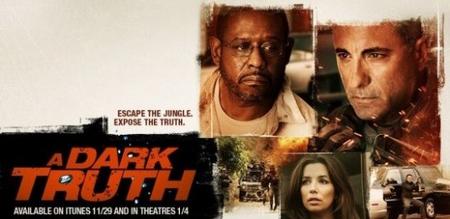“A Dark Truth” Disrespects Latin American Struggles for Water Rights
“Escape the jungle, expose the truth!” is the teaser for a new eco-thriller coming soon to a theater near you. Featuring Andy Garcia, Forest Whitaker, and Eva Longoria, “A Dark Truth” tells the story of a fictional multi-national corporation (ClearBec) that instigates a peasant massacre in a South American village, to cover up a typhus epidemic after inadvertently poisoning the water supply that has been privatized under its control.Unfortunately, despite its subversive pretensions, this film sensationalizes and over-simplifies the contemporary conflicts over water rights and environmental justice in Latin America that it purports to represent, and disrespects the popular movements that are the main protagonists of those struggles.The plot is thick with family and political intrigue (spoiler alert). A corporate daughter who is a major shareholder blows the whistle on her CEO brother, sending an ex-CIA operative-turned-political-talk-show-host (Jack Begosian) south of the border to investigate. Begosian rescues peasant leader Francisco Francis from the jungle, carrying documentary evidence of the corporate misdeeds—an act that redeems Jack's own transgressions from his CIA days, when he framed Francis as an ecoterrorist and sent him to prison for more than a decade.Two suicides, several brutal murders, and many throat-slittings later, Francis makes a guest appearance on Begosian’s talk show to denounce the evils of water privatization. The corporate sister steers ClearBec in a new accountable direction, after her evil brother is indicted for murder conspiracy (and becomes one of the two suicides). All seems right with the world.Except for a few major problems. Strikingly, all the heroes of “A Dark Truth”—including the ex-CIA agent, the corporate whistle-blower, and the assassin hired to kill Begosian who experiences a change of heart—are North Americans. Even Francisco Francis, the fictional dark-skinned peasant leader, is portrayed as a San Francisco native with a PhD in environmental studies who came to South America as a Greenpeace activist and then went on to found the (real-life) international peasant organization Via Campesina.While the film features plenty of indigenous peasants, they are mostly depicted as individual victims of army atrocities (except for one scene where the villagers rise up with sticks to impede Francis’s capture). Despite the verbal nod to Via Campesina, nowhere in this film is there a portrayal of the popular organizations, movements, and native leaders that have been the main protagonists in Latin American struggles for water rights and environmental justice —such as the broad alliance of farmers, factory workers, water committees, and neighborhood organizations that revolted against privatization during Bolivia’s iconic “water wars.” (In contrast, the recent fiction film “También La Lluvia” realistically conveys the agency of these popular forces.)
[ed notes;click link for whole article..
President Karol Nawrocki Vetoes Poland’s EU Digital Services Act
Enforcement Bill, Citing Censorship Concerns
-
By Dan Frieth | Reclaim The Net | January 12, 2026 President Karol Nawrocki
has blocked a government proposal meant to enforce the European Union’s
censors...
3 hours ago




No comments:
Post a Comment